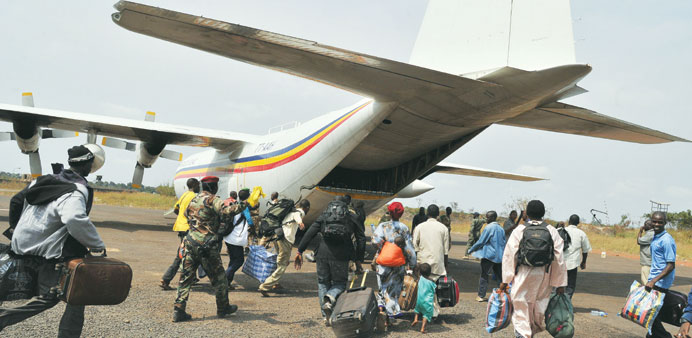|
African leaders toiled yesterday over how to stamp out two spiralling conflicts on the continent, warning urgent solutions were needed to prevent South Sudan and the Central African Republic (CAR) from “falling into the abyss”. |
The African Union (AU) summit wrapped up with calls to boost support for a peacekeeping mission on the ground in Central Africa, and send monitors to oversee a shaky ceasefire in South Sudan.
The meeting was meant to focus on agriculture and food security, however the 54-member bloc yet again spent most of the time bogged down trying to resolve conflict in member states.
Ethiopian Prime Minister Hailemariam Desalegn warned of the need for “urgent solutions” to prevent the two nations “from falling into the abyss”.
AU Peace and Security Council chief Smail Chergui said yesterday that more support was needed for the CAR, with a donor conference due today following the closure of the official summit.
The CAR descended into chaos 10 months ago after rebels overthrew the government, sparking violence between the Christian majority and Muslim minority that has uprooted 1mn people out of a population of 4.6mn.
The more than 5,000 AU troops deployed alongside 1,600 French soldiers are under-funded and in dire need of extra support, the conference heard.
While African troops serve in UN missions across the continent, including South Sudan and the CAR, a long-planned African standby peacekeeping force has yet to materialise.
UN deputy secretary-general Jan Eliasson called for more to be done on the “long-standing” issue.
“A very big problem for the African Union is of course financing their operations,” Eliasson said. “I would very much hope that we would see more action taken in the area of standby capacities.”
The AU force in Central Africa, known as MISCA, is supposed to reach 6,000 troops but deployment has been slow.
African Union director of peace and security El Ghassim Wane said MISCA had 5,300 troops on the ground and expected 700 from the Democratic Republic of the Congo for a total of 6,000.
Rwanda, Burundi, Chad, Cameroon and others have already sent troops.
“I can assure you that by the end of the programme in March we will have all troops on the ground,” Wane told Reuters.
Diplomats suggested that even when the force was at its full strength, it may struggle to secure vast areas outside the CAR’s capital Bangui, hinting at a need to increase troop numbers in the future.
Despite a new government being put in place, there has been no let-up in the horrific interreligious clashes in Bangui and the interior, with at least 30 killed in the capital in the past three days, the Red Cross said yesterday.
AU Peace and Security Council chief Chergui said that the force had done a “noble job” and despite increasing demands on the AU troops, insisted there were no current plans to transform the force into a UN peacekeeping mission.
Guinean President Alpha Conde said that Algeria had promised transport aircraft, while the AU has also lobbied Angola and South Africa to follow suit.
The European Union, which has promised to send 500 soldiers, said yesterday that it was ready to put 25mn euros ($34mn) into the MISCA fund and provide another 20mn euros for the country’s electoral process.
EU development commissioner Andris Piebalgs said the extra money would bring total EU commitments to the Central African Republic since the crisis began to about 200mn euros.
France has called for a UN peacekeeping force. Its UN Ambassador Gerard Araud said transforming the African Union force into a UN operation would bring guaranteed funding.
The World Food Programme, a UN agency which has provided food aid to 220,000 people displaced by the crisis since the start of the year, also appealed for more money yesterday.
“WFP urgently needs $95mn to immediately distribute life-saving food assistance and to pre-position food stocks before the rains start in April and roads become impassable,” it said in a statement.
Talks on South Sudan took place on the sidelines of the main AU summit, as East African leaders met to bolster peace efforts following the fragile ceasefire they brokered last week.
Both UN special envoy Haile Menkerios and US special envoy Donald Booth said that it was “critical” monitoring teams be put swiftly in place to report on any violations, including by foreign forces.
Both government and rebels accused each other of violating the deal, but insist they are committed to ending a bloodshed in which thousands have been killed and more than 850,000 forced from their homes.
“The cessation of hostilities is not holding 100%, in fact there are several skirmishes, very serious ones in a couple of cases,” Eliasson said.
The UN reported recent clashes in the three states of Unity, Upper Nile and Jonglei, with the number of those fleeing violence continuing to grow, the UN said yesterday. “The South Sudan situation is like a wound ... where there is a risk of an infection, and if that spreads and this becomes a regional issue, it is getting more dangerous.”
Clashes continued yesterday, one week since a ceasefire came into force, with aid agency Medecins Sans Frontieres (MSF) saying that its hospital staff in the town of Leer had fled fighting, carrying “dozens” of the most sick patients to hide in the bush.
“The situation became too unstable and the only way to provide medical care was to take patients out of the hospital and to flee with the population into the bush,” said MSF head of mission Raphael Gorgeu.

